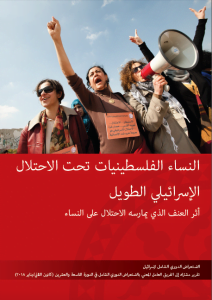You can find the Arabic version of this blog here
The Women’s International League for Peace and Freedom (WILPF) has always thrived to amplify women’s voices and bring their experiences to human rights bodies and the international fora.
The Universal Periodic Review (UPR) is a State-driven process under the Human Rights Council (HRC) which involves a review of the human rights records of all UN Member States. It contributes to improving the human rights situation and addressing human rights violations in all countries. Through submitting UPR reports, WILPF along with partners serve to bring gender analysis of peace and security to these discussions and debates and increase women and civil society access to these processes.
For the UPR to be effective, it is essential for Non-Governmental Organisations (NGOs) to bring to its attention local situations of human rights violations and monitor the positions taken by the Member States. Hence, a report tilted “Palestinian Women Under Prolonged Israeli Occupation: The Gendered Impact of Occupation Violence” Has been submitted to the UPR Working Group 29th session to take place in January 2018. The report is the product of collective work of Women’s Center for Legal Aid and Counselling (WCLAC), Community Action Center (CAC) – Al-Quds University, and The Palestinian Center for Development and Media Freedoms (MADA), and WILPF to assist the process of the UPR on Israel and the Occupied Palestinian Territories in 2017.
In January 2009, the Israel’s UPR resulted in 424 recommendations by contributing countries. Only 13% of those recommendations were accepted by Israel but none included recommendations specific to Palestinian rights. Based on the previous UPR, Israel has made some progress. However, fieldwork and research by Palestinian human rights organisations proves that little improvement has been made in incorporating this progress to Palestinians.
According to the report; Palestinian women regularly face violence, threats, intimidation, restriction on movement, and discrimination as a result of Israeli polices that violate international humanitarian and human rights law. The report highlights those human rights violations by the State of Israel on Palestinian women. It focuses on property destruction, demolition, and the lack of adequate housing; aggression and targeting of civilians; expansion of settlements and settler violence; forcible eviction of Palestinians from occupied Jerusalem, and collective punishment as a tool in forcible transfer; and targeting women human rights defenders, women journalists and activists.
This report contains a set of recommendations which aim at contributing to the effective realization of adherence to human rights and international humanitarian law in the Occupied Palestinian Territories and to stop the Israeli illegal practices that impact the lives of Palestinian women.
WILPF stands in full solidarity with the Palestinian women and supports their legitimate demands for dignity and human rights. Until resolved, WILPF will continue to bring this issue to the attention of the international community.









